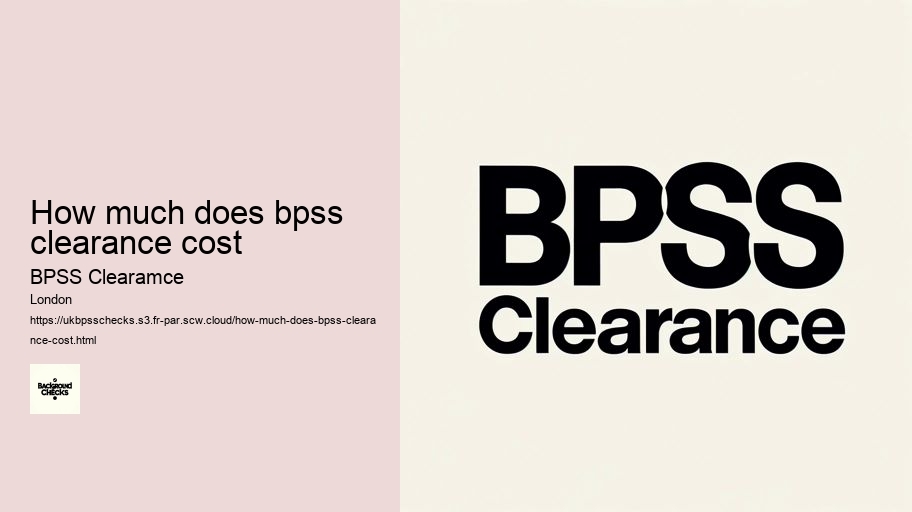
Moreover, digital technology supports ongoing monitoring and updating of BPSS clearances. Once an individual has been vetted, their information can be continuously checked against updated databases for any changes that might affect their security status, such as new criminal records or changes in financial status, ensuring ongoing compliance with security standards.
Ensuring you have all these documents in order will help streamline the verification process and increase the chances of successfully obtaining BPSS clearance.
There are also specific rules regarding non-discrimination that must be followed during the BPSS process.
- Cooperate fully with any additional background checks or enquiries that may be necessary.
These screenings affirm identity, employment history, national and immigration status, criminal record, and time spent abroad. Individuals needing access to UK OFFICIAL assets and occasional access to UK SECRET assets must undergo BPSS screening to uphold trustworthiness, honesty, and integrity in their roles.
Providing a valid passport or driver's license is essential for verifying your identity when applying for BPSS clearance. These documents serve as primary forms of identification and are vital in confirming who you are.

BPSS clearance is essential for those working in roles that require high levels of trust and integrity, especially within the UK government. Ensuring that individuals have BPSS clearance helps maintain national security and reduces the risk of insider threats.
Lastly, education professionals, particularly those in positions of trust and responsibility such as headteachers or senior administrators, often need BPSS clearance. They work in environments with young and vulnerable individuals and must ensure a safe and secure educational setting.
By verifying nationality, immigration status, employment history, and criminal records, organizations can assess the suitability of candidates for positions requiring access to sensitive information like the Public Services Network (PSN).
3. Some organizations may mandate more frequent renewals based on internal policies.
Training for HR personnel on the specifics of BPSS clearance is essential to ensure that all aspects of the vetting process are conducted correctly. Proper training helps mitigate the risk of errors or oversights that could compromise the security of the vetting process and ultimately, the organization's operations.
BPSS checks are typically required for individuals working in, or on behalf of, the UK government. This includes various roles within the public sector, such as in defense, health services, and law enforcement. Additionally, private sector employees who are contracted to work on government projects that require access to sensitive or classified information also need to undergo these checks.


2. Renewal is required after the 3-year period to maintain access to government assets.
It's essential to be forthcoming with this information to facilitate a smooth and thorough BPSS clearance process.
Verifying your time spent abroad enables a thorough background check to determine your integrity and identify any security risks that may arise from those stays. Ensuring transparency in disclosing your overseas experiences is crucial for upholding the effectiveness and integrity of the BPSS clearance process.
Organizations that fail to properly conduct BPSS clearance may face significant risks, including security breaches and legal consequences. Ensuring that all employees undergo BPSS clearance before taking on roles that involve access to sensitive information is key to maintaining operational security and complying with national security regulations.
The enforcement of BPSS clearance is indirectly related to the Official Secrets Act, which provides a legal foundation for protecting state secrets and national security information. Individuals undergoing BPSS checks must often comply with the stipulations of this act, as it forms the legal backdrop against which security breaches are adjudged.
Regarding regulatory compliance, both standards must adhere to the UK's data protection laws, including GDPR. However, BS7858:2019 also outlines specific storage and handling procedures for the sensitive information gathered during the vetting process, reflecting its more rigorous data collection. This includes requirements for how data should be secured and the duration it can be kept before needing to be securely disposed of.

Applicants need to provide documents like a passport or driver's license to confirm their identity. Right to Work Confirmation: Legal documentation proving the right to work in the UK, such as a passport or Home Office document, is required. Criminal Records Check: Verification of any unspent criminal records is crucial for evaluating suitability for BPSS clearance. Employment History Validation A minimum of three years of employment history must be provided to complete the recruitment process.
In summary, undergoing a BPSS check is essential for individuals seeking roles with access to sensitive information and government assets. It guarantees a secure work environment by verifying essential personal and professional details, affirming trustworthiness, and upholding honesty and integrity. As the future of BPSS compliance evolves, staying up to date with the process and maintaining valid clearance is vital for individuals in sensitive positions.
The duration of a Baseline Personnel Security Standard (BPSS) check can vary significantly based on several factors, including the complexity of the individual's background, the efficiency of the vetting process, and the responsiveness of various data sources. Understanding the timeline for a BPSS check is crucial for both employers and candidates to plan accordingly.
BPSS stands for "Baseline Personnel Security Standard." It's essentially a basic level of security clearance required for individuals working in roles that involve access to sensitive information or facilities, especially in the public sector. The BPSS checks typically include identity verification, employment history checks, and criminal record checks.
No, BPSS (Baseline Personnel Security Standard) and DBS (Disclosure and Barring Service) are not the same.
BPSS (Baseline Personnel Security Standard): This is a set of government guidelines in the United Kingdom for ensuring the security clearance of individuals working with sensitive information or in certain roles. It is a basic level of security clearance and involves checks such as identity verification, employment history, and criminal record checks. BPSS is often required for roles in both the public and private sectors where access to sensitive information or facilities is involved.
DBS (Disclosure and Barring Service): This is a government agency in the UK that performs checks on individuals working with children or vulnerable adults. The DBS conducts criminal record checks (previously known as CRB checks) to help organizations make safer recruitment decisions by identifying candidates who may be unsuitable for certain roles due to past criminal convictions, cautions, reprimands, or warnings.
While both BPSS and DBS involve background checks, they serve different purposes and are used in different contexts. BPSS focuses on security clearance for a broader range of roles, including those involving access to sensitive information, while DBS specifically focuses on roles involving work with vulnerable groups.
The Baseline Personnel Security Standard (BPSS) checks typically include:
Identity Verification: Verifying the identity of the individual through official documents such as passports, driver's licenses, or other government-issued identification.
Employment History Checks: Verifying the individual's employment history to ensure accuracy and assess their suitability for the role.
Criminal Record Checks: Checking for any criminal convictions or cautions. This is often done through a Basic Disclosure from the Disclosure and Barring Service (DBS) in England and Wales, Disclosure Scotland in Scotland, or AccessNI in Northern Ireland.
Verification of Address: Verifying the individual's current and previous addresses to ensure accuracy and completeness of their background information.
These checks are aimed at establishing a baseline level of trustworthiness and suitability for individuals working in roles that require access to sensitive information or facilities, particularly within the public sector but also in some private sector positions.
A valid proof of address for a Baseline Personnel Security Standard (BPSS) check typically includes official documents that clearly display the individual's name and current address. Common examples of acceptable proof of address documents may include:
Utility Bills: Recent bills for services such as electricity, gas, water, or landline phone, issued within the last three to six months.
Bank Statements: Recent bank statements, typically issued within the last three to six months, showing the individual's name and address.
Official Letters: Letters from government agencies, local authorities, or financial institutions, such as tax statements, council tax bills, or letters from the Department for Work and Pensions (DWP), which display the individual's name and address.
Tenancy Agreements: A signed and dated rental or lease agreement for accommodation, showing both the tenant's and landlord's details, along with the property address.
Mortgage Statements: Statements from a mortgage provider showing the individual's name and property address, issued within the last three to six months.
It's important to note that the specific requirements for proof of address may vary depending on the organization conducting the BPSS check. Additionally, the document should be recent and not expired, and it should clearly display both the individual's name and current address.
A Baseline Personnel Security Standard (BPSS) check is typically required for individuals working in roles that involve access to sensitive information or facilities, particularly within the public sector but also in some private sector positions. While specific requirements may vary depending on the organization and the nature of the role, BPSS checks are commonly needed for individuals who:
In summary, individuals who require a BPSS check are those whose roles involve a level of trust, responsibility, and access to information or facilities that necessitate verification of their identity, employment history, and suitability for the position.
The Baseline Personnel Security Standard (BPSS) does not have an expiry date like some other security clearances. Instead, it serves as a foundational level of security clearance that establishes an individual's baseline trustworthiness and suitability for roles requiring access to sensitive information or facilities.
However, while the BPSS itself does not expire, organizations may have their own policies regarding the periodic review or renewal of security clearances for their employees. For instance, some employers may require employees to undergo regular rechecks or refreshes of their background checks, including BPSS checks, to ensure that their security clearance remains up to date.
Therefore, although the BPSS clearance itself doesn't have a fixed duration, individuals and organizations should be aware of any policies or requirements related to maintaining and updating security clearances in accordance with best practices and organizational guidelines.